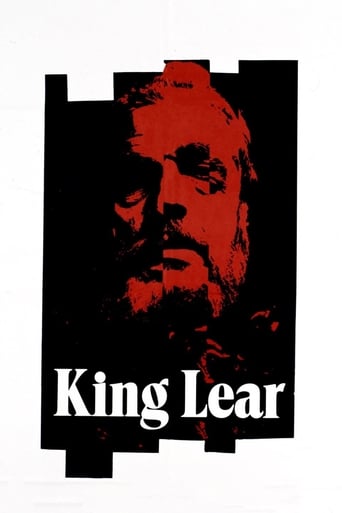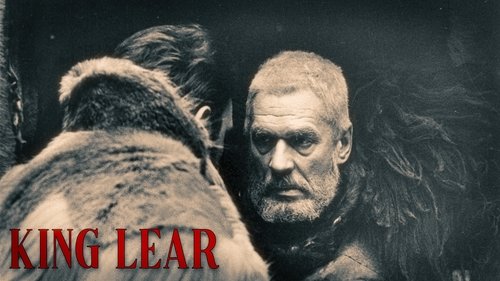donelan-1
This was the first performance of King Lear I saw (live or film) that really worked: first, because it is true to Shakespeare; and second, because it is conceived as a film. Yes, many scenes are truncated, but nothing essential. If anything, our impressions of the characters are strengthened because we see only what brings out their traits and relations with each other most strongly. As cinema, it works because it is so visual. Consider the scene near the end, for instance, where Edgar (faceless in plate armor) challenges his bastard brother. Edmund's response is cut to one line, "In wisdom I should ask your name." The setting sun glints from the edges of their axes. Then after one flurry of brutal action, Edmund is dying and gasping out his belated repentance. In most performances, the essentials of this scene are lost by prolonging the combat with swashbuckling acrobatics, but Brooks shows us exactly what we need to see, with no distractions. After the film, I saw a local actor come out who had recently played Lear in a live performance. He was in shock.Laurence Olivier's film of Lear, by contrast, works because of his performance, which is transcendent. He brings the character vividly to life, and makes us care about him, with many small nuances of gesture, facial expression, and movement - not only when he is speaking, but also in reaction to other characters. It is a classic example of an actor adapting a staged performance for film by scaling down his gestures and taking advantage of the intimacy of the camera. All the other versions of King Lear I have seen suffer from dull stretches, because either the actor playing Lear lacks emotional range, or the director distracts from the story and characters with too much stage business.Brooks and Olivier show us two ways to make the play work: by translating it into pure cinema, or by giving a performance that brings out the full range of Lear's character and tragedy.
Syl
What makes Shakespeare such a classic production is the talented actors like Paul Scofield C.B.E., C.H. and Irene Worth Honorary C.B.E. in their roles as King Lear and Goneril. I saw Irene Worth on Broadway in Lost in Yonkers but that was nothing compared to her role as Goneril. You forget the other actresses who play Cordelia and Regan. Her role of Goneril is chilling, complicated, icy, yet divine to watch. She really packs punches into this supporting role. Why Paul Scofield and Irene Worth were not nominated for Academy Awards is a shame because this film really works with the both of them in these roles. I can't imagine a better Goneril or a King Lear. The film was edited for the obvious reasons that all of Shakespeare's language cannot be used effectively but Peter Brook is a genius in knowing what Shakespeare would have wanted in this film. Peter Book C.B.E., C.H. is a Shakespeare expert and well-respected and beloved British director. He has done a remarkable job in bringing King Lear to life with a master such as Paul Scofield and Irene Worth's Goneril is absolutely divine! You can't take your eyes off her in this role.
Tom May
Ah, now for my 100th review, chalked up after roughly four years of semi-regular sly-winking IMDb usury... What better for the "occasion" than a controversial adaptation of perhaps William Shakespeare's finest tragedy?I watched this as part of my degree work on Shakespeare; I decided to focus on Shakespeare films, tracked down as many as I could and watched a good few. This was the first I viewed, and can I emphasise how contrasting a view of "Lear" it is as compared to Kurosawa's "Ran"? Whereas that film is wilfully expansive and an epic, if not a history, Brook's "King Lear" is a pared down, Beckettian film visualisation of the play. There are very few backgrounds, characters' faces frame so many shots, creating a claustrophobic focus. The interiors that there are are bleak, barren, less than inviting places; there is no sense of a royal grandeur (unlike "Ran") from which Lear falls. Lear himself is played as an unfeeling, almost robotically callous chap early on, with Scofield delivering the lines in a very restrained, unexpressive way. This is far from the passionate, headstrong character of most performances. He is a husk of a man, and a dulling bully of a monarch, shown by the naturalistic, unbalanced violence he displays when in Goneril's castle. The feeling of Lear, later on in the play as genuinely a "fond" as well as "foolish" man, is downplayed deliberately. Again, the delivery of Shakespeare's poetry is muted. He comes across as perhaps too restrained and passionless in the later stages. The shift from power to impotence is however excellently conveyed during the storm scene, as first we see a shot of Lear from below, which then shifts quickly to one from a bird eye's view – Lear has been shown first as in control and central and then rendered a mere insignificant human being, with no control over anything. Scofield however, does do very well, carrying out this very distanced, disquieting Lear of Brook's instruction, to the letter.Other actors impress, and are much as restrained; there is little or no actorly show here, the emphasis is on Beckettian delivery of lines, paring down the expression to suggest the futility of expression; words as a mechanical act churned out by humanity, making no difference in a barren, Godless universe. Brook uses Beckett's adage: 'There is nothing to express, nothing with which to express, nothing from which to express… together with the obligation to express'. One can well say this is a reductive reading of Shakespeare, but it is spectacularly successful at its perhaps narrow aim. There are countless grounds in Shakespeare's Lear from which such an interpretation is born – the play on 'nothing' – 'Nothing will come of nothing' – and the example of Cordelia's death, which suggest a Godless, reasonless world in its arbitrariness.Visually, Jack MacGowran and Patrick Magee, notable Beckett actors, make strong impressions, like Scofield, even if their parts are smaller. Susan Engel and Irene Worth are excellent and look just right as Regan and Goneril respectively, whereas a particularly downplayed Cordelia doesn't make much impression - the Christ-like element is absolutely not dwelt upon here, predictably, for what is a nihilistic interpretation. Peter Brook's film could perhaps be argued to take place in the Dark Ages, but Brook is clearly interpreting the play in a universally, timeless Beckettian sense. One could liken the film's austerity to the Swedish writer-director Ingmar Bergman, but this film is certainly pared down in terms of setting and costume when compared with 'The Virgin Spring' or 'The Seventh Seal'. Brook's approach to Shakespeare shares none of the solace that Bergman finds in humanity in 'The Seventh Seal' with Max von Sydow's Knight's sublime moments with the couple of players. Brook's world-view is clearly informed by the Jan Kott school of Shakespeare criticism; the natural world is a reflection of the human one. Both spheres are bleak and hopeless, as marked by the indiscriminate, desolate Northern landscapes and the equally random acts of cruelty and violence perpetrated by the characters. A complete lack of incidental music suggests Brook is trying not to distract the viewer in any way from the effect he is trying to create. It has been argued this interpretation is reductive to the play's language, and single-mindedly closes off many avenues in the play – Kingship, courtly manners and politics are but a few concerns that are neglected by Brook. Brook's film continually attempts to alienate the viewer, with jarring, incessantly restive camera movement and unorthodox angles. The moment of Gloucester's blinding sees Brook metaphorically blind the viewer to the action by having the screen blank; a Brechtian distancing technique, exposing the artifice of cinema and the subjective power the director has. Brook opts to make the play's usual climax point – the Edmund-Edgar duel – deliberately anti-climatic. He undercuts any heroism on Edgar's part by making the fight short and brutish, devoid of any skill whatsoever – Edgar arbitrarily wins. Likewise, the fates of Goneril and Regan are dispatched with a hurried violence. This 'Lear' ends inconclusively with no hope for the future – it does not end directly with Edgar's 'The weight of this sad time' speech, but with the shot of Lear's head tilting back, gradually out of sight against a completely white sky. This expression of emptiness – both that Lear is going neither to Heaven or Hell and that things are not likely to get any better or worse. A very impressive film, that certainly has divided critics. While the "ultimate" film "Lear" may not have been made yet (at least from the ones I have seen), this is a brilliant, bleak, Beckett-informed version. A powerful, wonderfully alienating and stark Shakespeare.




